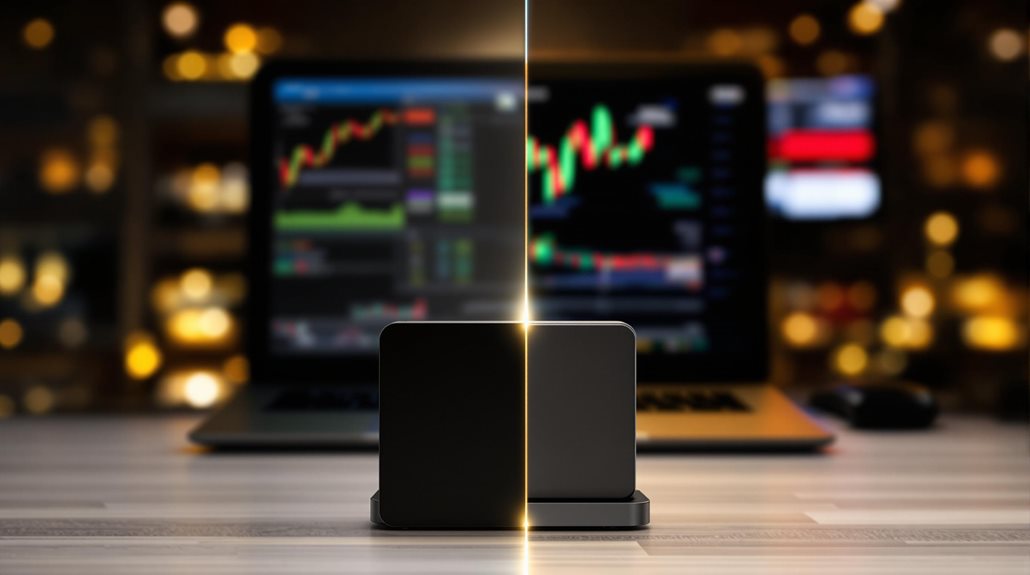Cryptocurrency wallets and exchanges serve different purposes in digital asset management. Wallets are like secure digital safes that store private keys and allow users to directly control their crypto, often with enhanced security features. Exchanges function more like online marketplaces where people can buy, sell, and trade cryptocurrencies using user-friendly interfaces. While exchanges offer convenience and trading tools, wallets provide better security and privacy through direct blockchain access. Understanding these key differences helps users make informed choices about managing their digital assets.

When it comes to handling cryptocurrency, users have two main options: wallets and exchanges. These tools serve different purposes and come with their own sets of features and limitations. Cryptocurrency wallets are designed to store and manage digital assets securely, while exchanges function as platforms where users can buy, sell, and trade cryptocurrencies.
Wallets focus primarily on security and control. They give users complete ownership of their cryptocurrency by storing private keys, which are like digital passwords that prove ownership. There are different types of wallets, including hardware wallets that keep crypto offline in what's called "cold storage." Popular hardware wallets like Trezor and Ledger provide robust security features for users. This approach helps protect assets from online threats and hacking attempts that sometimes target exchanges. Decentralized wallets offer enhanced security through peer-to-peer networks, eliminating the need for third-party intermediaries.
Exchanges, on the other hand, make it easier for people to get started with cryptocurrencies. They offer user-friendly interfaces and simple ways to convert regular money into crypto and back again. Exchanges also provide advanced trading features and tools that help users analyze markets and make trades. However, exchanges act as custodians, meaning they hold and control users' cryptocurrencies, which can be riskier if the exchange gets hacked or faces other security issues. Regular security audits help exchanges identify and fix vulnerabilities before they can be exploited. Many exchanges offer additional services like staking and lending to enhance portfolio management.
The technical requirements for using these tools differ considerably. Exchanges are typically easier to use, working much like traditional banking apps. Wallets often require more technical knowledge, but they allow users to make direct peer-to-peer transactions on the blockchain. This direct control means users don't have to worry about exchange-imposed withdrawal limits or account freezes.
Security measures vary between the two options. While exchanges use features like multi-factor authentication to protect users, they remain vulnerable to large-scale attacks because they're centralized platforms holding many users' funds. Wallets reduce this risk by giving users direct control over their private keys, following the popular crypto principle "not your keys, not your coins."
Privacy is another key difference. Wallets generally offer more privacy and anonymity since users can make transactions directly on the blockchain. Exchanges must follow regulations that require them to collect user information and monitor transactions.
While exchanges provide convenience and easy access to cryptocurrency markets, wallets offer greater security and control over digital assets. Each option serves distinct purposes in the cryptocurrency ecosystem, with users often using both tools to manage their digital assets effectively.
Frequently Asked Questions
How Much Money Should I Keep in My Crypto Wallet?
The amount kept in a crypto wallet varies based on several factors.
Most experts note that hot wallets (online wallets) shouldn't hold more than 5-10% of someone's total crypto assets due to security risks. The rest typically goes to cold storage, like hardware wallets.
People's individual risk tolerance, investment goals, and need for quick access to funds play key roles in determining their wallet balance.
Can Cryptocurrency Exchanges Be Hacked and Lose My Assets?
Yes, cryptocurrency exchanges can be hacked. History shows many examples of successful attacks. In 2022 alone, hackers stole $3.8 billion from crypto platforms.
Some major hacks include Ronin Network ($615 million), Poly Network ($611 million), and FTX ($600 million).
While exchanges use security measures like multi-factor authentication and cold storage, they're still targets for cybercriminals.
North Korean hackers have been particularly active, stealing over $1 billion in 2023.
What Happens to My Crypto if I Lose My Wallet Password?
When someone loses their crypto wallet password, they can't access their digital money anymore.
It's like being locked out of a safe forever.
There's no help desk or company to call for password recovery since crypto works without central control.
While some recovery options exist, like backup phrases or specialized software, they don't always work.
Many people have lost millions in crypto because of forgotten passwords.
Which Cryptocurrency Wallets Work Best With Defi Applications?
MetaMask is widely considered the go-to wallet for DeFi applications, as it works with over 17,000 dApps and supports Ethereum-based networks.
Trust Wallet offers good DeFi access too, connecting to 65+ blockchains through its mobile app.
The Crypto.com DeFi Wallet lets users access yield farming and staking features easily.
Ledger's hardware wallet also works well with DeFi protocols while providing extra security through cold storage.
Are Hardware Wallets Worth the Investment for Small Crypto Holdings?
Hardware wallets might not make financial sense for small crypto holdings. They typically cost $50-$200, which can be a large percentage of a small investment.
While these devices offer strong security features like offline storage and PIN protection, free software wallets often provide adequate security for smaller amounts.
Many crypto users find that hardware wallets become more practical when their portfolio grows larger and security needs increase.





